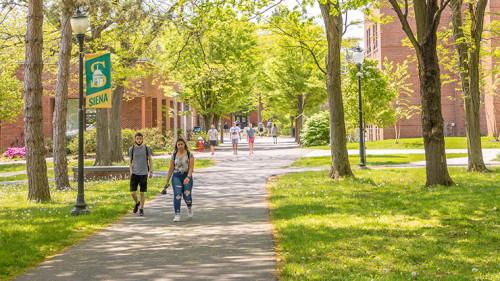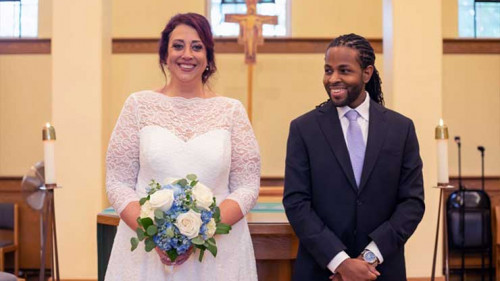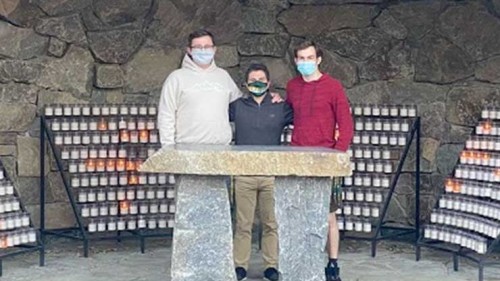
By Kristen Bossio '16
Siena College’s Creative Arts Department and student theatre program Stage III recently wrapped this semester’s main stage production, “Copenhagen.” The play by Michael Frayn explores what could have happened when German physicist Werner Heisenberg made an impromptu visit to Nobel Prize winning physicist Neils Bohr in Copenhagen, Denmark in 1941.
Heisenberg had not fled Germany but remained to work on Hitler’s atomic energy program, which Nazi authorities claimed was “in the pursuit of peaceful energy solutions.” Denmark was under German occupation by 1941, so the men found themselves on very different sides of the war. In “Copenhagen,” Frayn explored what might have taken place in the private meeting between Bohr and Heisenberg — and the ghosts of an atomic age that haunt us to this day.
“The stories that keep surfacing about World War II are endlessly fascinating to me,” said Director and Assistant Professor of Creative Arts David Lane. “Admittedly, I didn't know much about Bohr and Heisenberg until I read the play and as I looked into the story, there was a curious fact about the play that I kept coming back to – that after all these years, the mystery behind their meeting in 1941 was still very much a mystery.”
With only three characters on stage, the show presented quite a challenge to the performers. Sean T. Baldwin ’14 played Bohr, Matthew Tenorio ’16 acted as Heisenberg and Emily Scimeca ’14 played Margrethe Bohr.
The actors had to be acutely aware of their character’s motivations and intentions while remaining present and in the moment because the only time any of them left the stage was during intermission.
“The biggest challenge of this play is finding ways to manage the text. There are no scenes, no scene numbers, no entrances, and no exits,” said Lane.
Adding to the excitement, “Copenhagen” was performed “in the round,” meaning that the stage was a circle and the audience was seated on all sides.
Due to the show’s heavy historical and scientific context, professors from other disciplines brought the play to life by sharing their expertise with the cast. Visiting Assistant Professor of History Mara Drogan, Ph.D. and Assistant Professor of Physics and Astronomy Graziano Vernizzi, Ph.D. met with the actors and helped them to accurately portray their characters on stage.
“As a physics major, I understood most of the concepts talked about in the show. Also, the script is pretty clear in discussing topics such as uncertainty and complementarity,” said Tenorio. “Having Dr. Vernizzi come in to talk with us helped us to understand the topics more clearly. Knowing about these topics made it easier to convey them.”
Copenhagen was an interesting experience for the three actors involved. They learned new theatrical concepts, were exposed to history and science and ultimately made deep connections with each other.
“My best memory of this experience was just spending time with Sean and Em in their last show here at Siena,” said Tenorio. “We all got pretty close and it was just a great honor to work with the both of them because they are both extremely talented.”
While the show used historical events and scientific terminology, Lane hoped audiences would look past the jargon to see the heart of the show.
“I hope people come away thinking about present day choices we make directly or indirectly, and the ethical imperatives connected to them – those choices really do have the power to repair the world,” said Lane.
Delia Ernst ’16 served as the stage manager for “Copenhagen” and Marybeth Condon ’15 serves as assistant stage manager.
Photos Courtesy of Katria Foster



